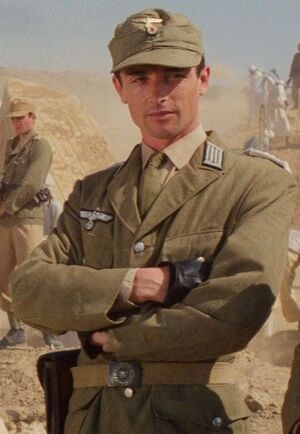Florian Güldenstädt
Florian Güldenstädt | |
|---|---|
 | |
| Birth name | Florian Ralf Thorsten Güldenstädt |
| Born | 10 March 1900 Dornwerder, Poysfelden-Griesmölsen Province, Autocratic East Europan Imperial Alliance |
| Died | 12 September 2007 (aged 107) Wolfsmarkt, Cloppenhan Province, Autocratic East Europan Imperial Alliance |
| Allegiance | |
| Branch | |
| Years of service | 1921 – 1975 |
| Rank | |
| Unit | Peltast Battalion, 65th Light Infantry Regiment, 71st Infantry Division, Seleucia Korps |
| Battles/wars | |
| Relations |
|
Florian Ralf Thorsten Güldenstädt (10 March 1900 – 12 September 2007) is an East Europan field officer who commanded the famous Peltast Battalion of the 65th Light Infantry Regiment, which was a contingent military formation in the Seleucia Korps. He is the great-grandfather of renowned Neocon War hero Adalbrecht Güldenstädt.
Florian was born in Dornwerder to a small business family. He helped his family with deliveries when he was young up until his adolescence. He enrolled in the Mistelhausen Imperial Military School, and was comissioned a lieutenant. His first service was in the Estharian Civil War with the Imperial East Europan Estharian Corps, and first met Thessalonice VI zu Schärtal-Tangersten, Franz Pixodarus zu Schärtal-Tangersten, and Arthur Saltzmann. During the Second Europan War, he was assigned to the newly formed Seleucia Korps and was given command of the 3rd Battalion of the 65th Light Infantry Regiment, which will later be famous recognized within the Reichsarmee and beyond as the "Peltast Battalion." During the Desert of Blood, he, with orders from Alexander Sundermann, prevented his regiment from participating in the atrocities, and was notably horrified at the crimes. In 1942, he fought against the transfer of Thessalonice to the SS, but was forced to resign his attempt on advice from Sundermann. He would continue to fight in the Korps until the end of the Central Highlands Campaign, where he would surrender. He returned to East Europa upon the prisoner exchange, and served as a general officer during the War of Lorican Aggression. He retired in 1975, and reunited with Thessalonice upon her return with her family. He lived as a small business owner in most of his later years, and died on 12 September 2007 in Wolfsmarkt.
He is known to be witty and flirty, especially towards Thessalonice, which lead to interferences from Franz Pixodarus at some points. His and Sundermann's memoir about his experiences with the Seleucia Korps, titled The Long Retreat: From Mesopotamia to Quenmin, became an international bestseller, and was adapted into a 2000 film.